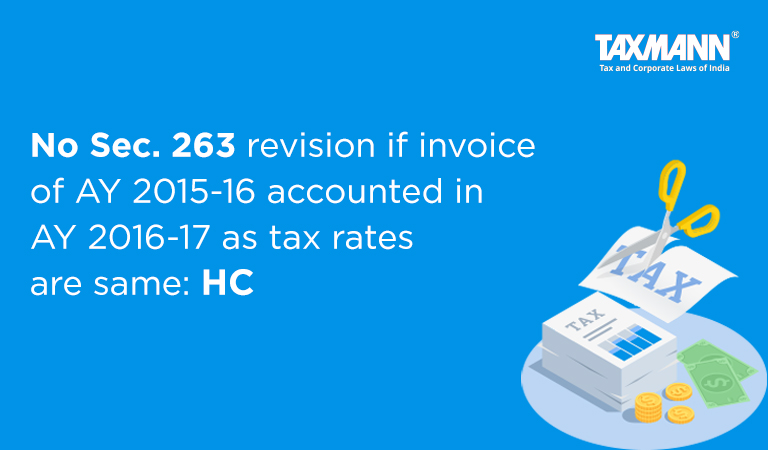No Sec. 263 revision if invoice of AY 2015-16 accounted in AY 2016-17 as tax rates are same: HC
- Blog|News|Income Tax|
- 2 Min Read
- By Taxmann
- |
- Last Updated on 30 December, 2022

Case Details: PCIT vs. Britannia Industries Limited - [2022] 145 taxmann.com 618 (Calcutta)
Judiciary and Counsel Details
-
- T.S. Sivagnanam & Hiranmay Bhattacharyya, JJ.
- Amit Sharma, Adv. for the Appellant.
- R.K. Muraka, Sr. Adv. Ms Sutapa Roy Choudhury & Ms Aratrika Roy, Advs. for the Respondent.
Facts of the Case
Assessee-company filed its return of income for the Assessment Year 2016-17 and the assessment was completed by the Assessing Officer (AO). Later, the Principal Commissioner of the Income Tax (PCIT) invoked section 263 on the ground that the assessee claimed advertisement expense which was a prior period item. Such expense was related to Assessment Year 2015-16.
The assessee approached the Tribunal against section 263 revision and got relief. Aggrieved-PCIT filed the instant appeal before the Calcutta High Court.
The assessee pointed out that such expenses were not claimed in Assessment Year 2015-16 as the assessee was not able to obtain the essential documents from the payee. Such documents were provided in the Assessment year 2016-17 and hence the assessee accounted for the bill only during that Assessment Year.
High Court Held
The Calcutta High Court held that the Tribunal recognized that the non-resident’s invoices (payee) for advertisement expenses in June 2014 were accepted as a liability and recognized for payment in the current year because the non-resident provided the required documents (such as TRC and no PE certificate) only during the current assessment year.
Further, there was no impact on revenue and no harm to the revenue since the tax rate applicable to the assessee during the assessment year 2015-2016 (when the invoices were issued) and the tax rate applicable during the assessment year 2016-2017 (when the invoices were accounted and paid) were the same.
Therefore, there was no basis for PCIT to invoke jurisdiction under section 263.
Disclaimer: The content/information published on the website is only for general information of the user and shall not be construed as legal advice. While the Taxmann has exercised reasonable efforts to ensure the veracity of information/content published, Taxmann shall be under no liability in any manner whatsoever for incorrect information, if any.

Taxmann Publications has a dedicated in-house Research & Editorial Team. This team consists of a team of Chartered Accountants, Company Secretaries, and Lawyers. This team works under the guidance and supervision of editor-in-chief Mr Rakesh Bhargava.
The Research and Editorial Team is responsible for developing reliable and accurate content for the readers. The team follows the six-sigma approach to achieve the benchmark of zero error in its publications and research platforms. The team ensures that the following publication guidelines are thoroughly followed while developing the content:
- The statutory material is obtained only from the authorized and reliable sources
- All the latest developments in the judicial and legislative fields are covered
- Prepare the analytical write-ups on current, controversial, and important issues to help the readers to understand the concept and its implications
- Every content published by Taxmann is complete, accurate and lucid
- All evidence-based statements are supported with proper reference to Section, Circular No., Notification No. or citations
- The golden rules of grammar, style and consistency are thoroughly followed
- Font and size that’s easy to read and remain consistent across all imprint and digital publications are applied



 CA | CS | CMA
CA | CS | CMA
